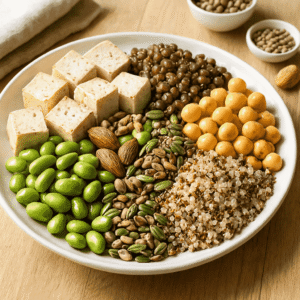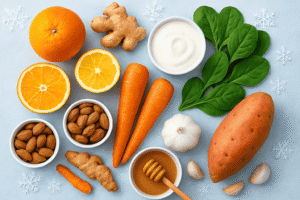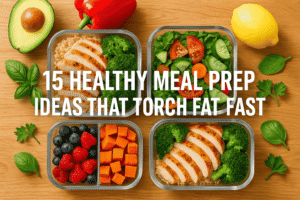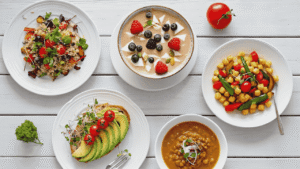Introduction
Trying to gain weight can be just as hard as losing it—especially if you’re someone with a fast metabolism or naturally lean body type. That’s where a 3000 calorie diet plan comes into play. Whether you’re aiming to bulk up, build muscle, or recover from illness or weight loss, this calorie-dense meal plan is your roadmap to healthy weight gain.
Why You Might Need a 3000 Calorie Diet
Individuals may require a 3,000-calorie diet for various reasons:
- Underweight Individuals: Those classified as underweight according to BMI may need additional calories to reach a healthy weight.
- Athletes and Bodybuilders: Increased caloric intake supports muscle growth and energy demands.
- Medical Recovery: Post-surgery or illness recovery often necessitates higher calorie consumption to rebuild strength.
- High Metabolism: Some people naturally burn calories faster and need more to maintain or gain weight.
Who Should Follow This Plan?
This plan is ideal for:
- Underweight individuals trying to reach a healthy BMI
- Fitness enthusiasts looking to bulk up
- Athletes with high daily energy needs
- People recovering from surgery or illness
Always check with a healthcare provider before starting.
Understanding Caloric Surplus
What Is a Caloric Surplus?
A caloric surplus means consuming more calories than your body burns. This is the only way to gain weight. When you eat more than you burn, your body stores the excess as fat or muscle (especially if you’re strength training).
How Many Calories Do You Need to Gain Weight?
It depends on your age, gender, height, activity level, and metabolism. If your maintenance calories are around 2500, adding 500 extra brings you to 3000—which is perfect for slow, healthy weight gain.
Macronutrient Breakdown for 3000 Calories
Ideal Macronutrient Ratios
A balanced 3000 calorie plan might look like this:
- Protein: 20–25% (150–188g)
- Carbs: 45–55% (338–413g)
- Fats: 25–30% (83–100g)
Protein, Carbs, and Fats Explained
Importance of Protein for Muscle Gain
Protein builds and repairs muscle. Go for lean meats, eggs, beans, Greek yogurt, and whey protein.
Carbs for Energy and Recovery
Carbohydrates fuel your workouts and recovery. Think rice, oats, fruits, and whole grain bread.
Healthy Fats and Their Benefits
Fats support hormone health and calorie intake. Eat avocados, nuts, seeds, and olive oil.
Tips Before Starting Your 3000 Calorie Diet
· Consult a Professional: Speak with a healthcare provider or dietitian to tailor the plan to your needs.
· Meal Prep: Preparing meals in advance can help maintain consistency.
· Track Intake: Use apps or journals to monitor calorie and nutrient intake.
· Stay Hydrated: Adequate water consumption aids digestion and nutrient absorption.
Sample 3000 Calorie Meal Plan – Day by Day
Day 1 – Balanced and Basic
- Breakfast: 4 scrambled eggs, 2 slices whole grain toast, peanut butter, banana
- Snack: Greek yogurt with honey and almonds
- Lunch: Grilled chicken breast, brown rice, broccoli, olive oil
- Snack: Trail mix and smoothie (banana, whey, peanut butter, oats)
- Dinner: Salmon, sweet potato, green beans
- Late Snack: Cottage cheese and fruit
Day 2 – High Protein Focus
- Egg omelet with cheese, turkey bacon
- Protein shake post-workout
- Turkey sandwich, quinoa salad
- Tuna and crackers
- Steak, roasted veggies
- Protein bar and nuts
Day 3 – Vegetarian Option
- Oatmeal with almond butter, chia seeds
- Smoothie with pea protein, berries, oat milk
- Lentil curry, brown rice
- Avocado toast with boiled eggs
- Tofu stir-fry
- Yogurt and granola
Day 4 – High Carb for Energy
- Pancakes with maple syrup and peanut butter
- Banana and granola bar
- Pasta with meatballs
- Whole grain crackers and hummus
- Baked potato with cheese and chicken
- Popcorn with dark chocolate
Day 5 – Healthy Fats Boost
- Eggs fried in olive oil, avocado toast
- Peanut butter smoothie
- Salmon and quinoa bowl
- Almonds and dark chocolate
- Chicken Alfredo pasta
- Chia pudding
Day 6 – Muscle Building Focus
- Protein pancakes with Greek yogurt
- Protein bar and banana
- Beef burrito bowl
- Hard-boiled eggs and cheese
- Shrimp stir-fry with rice
- Whey shake and nut butter
Day 7 – Flexible Eating Plan
Choose your favorites from above. Mix and match to stay consistent but avoid boredom.
Snacks and Smoothies to Fill the Gaps
High-Calorie Smoothie Recipes
- Banana + Peanut Butter + Milk + Honey
- Oats + Almond Butter + Chocolate Protein + Greek Yogurt
Best Snacks for Weight Gain
- Trail mix
- Cheese cubes
- Energy bars
- Nut butters on toast
- Hard-boiled eggs
Foods to Prioritize
Whole Foods vs Junk Foods
Whole foods give you nutrients. Junk food may increase calories but with poor nutrition. Go for quality calories.
Nutrient-Dense Choices
Choose:
- Eggs
- Quinoa
- Chicken
- Avocados
- Whole grains
- Legumes
Common Mistakes to Avoid
- Skipping Meals: Consistency is key in maintaining a caloric surplus.
- Inadequate Protein Intake: Essential for muscle growth and repair.
- Overreliance on Junk Food: May lead to unhealthy weight gain and nutrient deficiencies.
Tracking and Adjusting Your Progress
When to Increase or Decrease Calories
If you’re not gaining weight after 2–3 weeks, add 200–300 more calories per day.
Monitoring Weight and Muscle Gain
Weigh yourself weekly, take progress pictures, and adjust the plan as needed.
Conclusion
A 3000 calorie diet plan is one of the most effective ways to gain weight in a structured, healthy, and sustainable manner. Whether you’re trying to bulk up, recover from weight loss, or fuel intense physical activity, this plan gives your body the support it needs.
Here’s why a 3000 calorie diet plan works and how you can benefit from it:
- Supports Healthy Weight Gain
A well-balanced 3000 calorie diet plan ensures that you’re gaining weight the right way—by building muscle and increasing strength rather than just adding body fat. - Provides Balanced Nutrition
It includes the perfect mix of macronutrients—carbohydrates, proteins, and healthy fats—ensuring your body gets what it needs to grow, recover, and perform at its best. - Great for Athletes and Active Individuals
If you’re training regularly or performing intense workouts, a 3000 calorie diet plan provides the energy and nutrients required to sustain performance and recovery. - Customizable and Flexible
The best part? You can tailor the 3000 calorie diet plan to suit your taste, cultural preferences, and schedule. There are endless options when it comes to meals and snacks. - Boosts Muscle Growth and Strength
When paired with strength training, the plan becomes a powerful tool for muscle building. Think of it as giving your muscles the fuel they need to grow. - Improves Overall Energy and Vitality
Many people notice they feel more energized, focused, and productive when they consistently follow a 3000 calorie diet plan rich in whole foods. - Easy to Track Progress
Keeping an eye on your weight, measurements, and physical performance will help you see how well your 3000 calorie diet plan is working—and where to make adjustments. - Encourages a Long-Term Healthy Lifestyle
It’s not just about gaining weight. A 3000 calorie diet plan teaches you to eat mindfully, cook more, and be more aware of how food fuels your body.
💡 Final Tips for Success with a 3000 Calorie Diet Plan
- Eat consistently—don’t skip meals.
- Add calorie-rich but nutritious foods like nuts, seeds, avocado, and olive oil.
- Focus on home-cooked meals to control ingredients.
- Stay hydrated and include protein with every meal.
- Track your calorie intake using apps or a food journal.
- Pair your diet with regular strength training.
- Get enough sleep and manage stress—it all counts toward progress.
In conclusion, the 3000 calorie diet plan isn’t just about eating more—it’s about eating smart. It’s a long-term commitment to better health, strength, and overall well-being.
So, stick with your 3000 calorie diet plan, stay consistent, and celebrate your progress as it comes. You’re not just gaining weight—you’re gaining power, confidence, and health.
FAQs
1. Can I gain weight with 3000 calories if I work out?
Yes, especially if you’re lifting weights. A 3000-calorie plan supports muscle growth.
2. Is a 3000 calorie diet healthy?
It’s healthy if it includes nutrient-dense foods and is balanced in protein, carbs, and fats.
3. How long does it take to see results?
You may notice changes in 2–4 weeks depending on metabolism, exercise, and consistency.
4. Can skinny people follow this plan?
Absolutely! This plan is ideal for hardgainers or those with high metabolic rates.
5. What if I feel too full to eat 3000 calories?
Break meals into smaller portions, use calorie-dense foods, and add liquid calories like smoothies.
6. What should I drink on a 3,000-calorie diet?
Water should always be your primary beverage, but you can also include milk, 100% fruit juices, protein shakes, and smoothies to boost your calorie intake.
7. Is it okay to include cheat meals in this diet?
Yes, occasional cheat meals are fine, but it’s important to ensure most of your calories come from nutrient-rich whole foods.
8. Should I eat late at night to meet 3,000 calories?
If needed, eating a light, nutritious meal or snack at night is acceptable and can help you reach your calorie goals.
9. Can vegetarians or vegans follow a 3,000-calorie diet?
Absolutely. Plant-based calorie-dense foods like legumes, whole grains, nuts, seeds, and plant oils make it possible to meet or exceed 3,000 calories.
10. Will I get fat on a 3,000-calorie diet?
Not necessarily. If you’re active and your body needs the extra energy, the weight gain will likely be lean mass. However, if you’re sedentary, it may lead to fat gain.
11. Can I use mass gainers to help reach 3,000 calories?
Yes, high-quality mass gainer supplements can be useful, especially if you’re struggling to eat enough whole foods.
12. Do I need to eat 6 times a day on a 3,000-calorie diet?
Not necessarily. While spreading meals throughout the day can help digestion and calorie intake, you can adjust your meal frequency based on your schedule and appetite.
13. How can I ensure I’m not just gaining fat?
Incorporate strength training into your routine and ensure you’re eating enough protein to support muscle growth.
14. What if I have a small appetite?
Focus on calorie-dense foods (like nuts, dried fruits, oils, and shakes) and avoid filling up on low-calorie, high-volume items like raw vegetables or broth-based soups.




